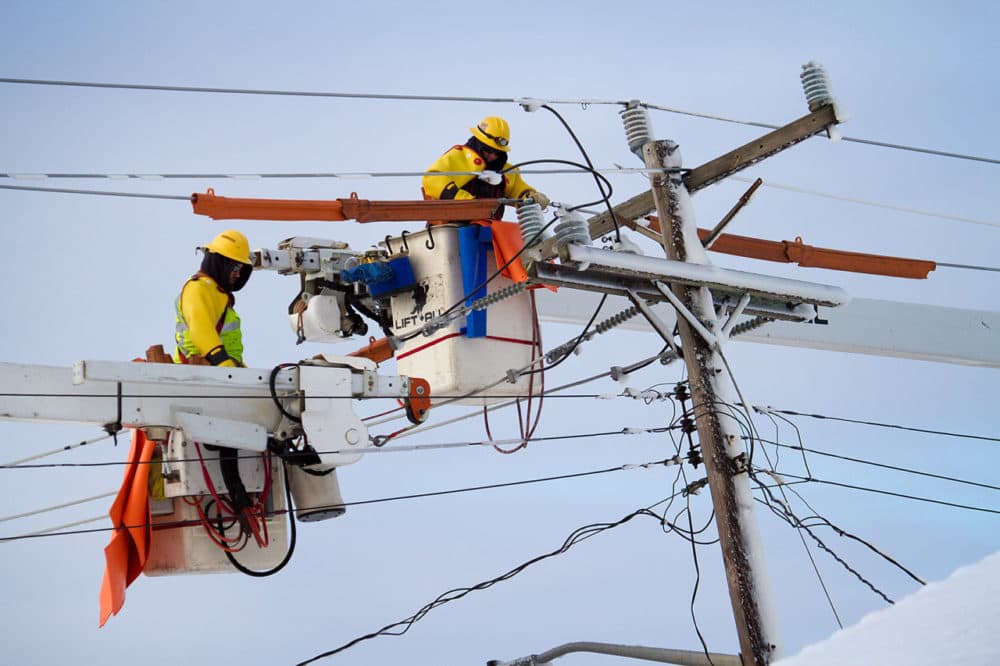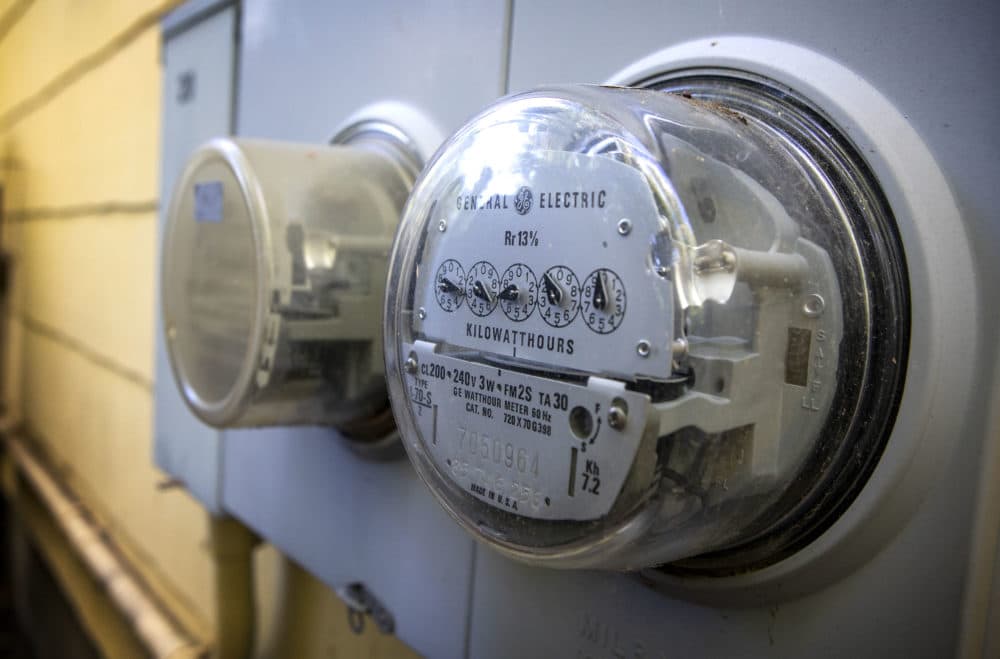Advertisement
Advocates want to limit how utilities pay for 'political activities' in Mass.

When you pay your monthly electric or gas bill, you give your utility money for a lot more than just the energy you use.
You pay for the cost of building and maintaining electrical wires or pipelines.
You pay for operating expenses like employee salaries and renting office space.
You pay for the state’s energy efficiency program.
And, experts say, you might also help pay for some of your utility’s attempts to influence climate policy or advance its other political goals.
“Right now, your electric or gas company is allowed to bill you for political activity that benefits their corporate interests and not necessarily your interests as a customer,” said Caitlin Peale Sloan, vice president of the Conservation Law Foundation in Massachusetts. “That's absolutely not something that customers should have to pay for.”
In the last few months Colorado, Connecticut and Maine have established new laws that explicitly prohibit monopoly utilities from charging customers for a broad range of “political activities” — things like lobbying expenses, annual dues to trade groups, certain advertising costs and other efforts to influence public opinion or policy. Those laws don’t prevent utilities from engaging in these activities, but they say that if companies do, they need to pay for it with company profits.
In the wake of these laws, Peale Sloan and her colleagues want Massachusetts to follow suit. And they do not believe the state has to pass a law to make it happen. In May, the foundation petitioned the Department of Public Utilities to unilaterally set stricter rules about how utilities can use customer money.
Advertisement
These changes are necessary two reasons, Peale Sloan said. First, because nationally utilities have used political influence or money to obstruct the clean energy transition. And second, because it’s unfair to ratepayers.
To be clear, the Massachusetts Department of Public Utilities, which oversees all investor-owned utilities in the state, does have standards about how utilities spend ratepayer money. Company expenses around lobbying, political campaign contributions and most charitable donations are only supposed to be financed by the company’s profits.
In emailed statements, spokespeople for Eversource and National Grid — Massachusetts’ two largest electric and gas utilities — said the companies follow all of these rules.
“In Massachusetts, utilities are already barred from including the cost of ‘political activities’ in customer rates and we have not included those costs in rates for many years,” said Chris McKinnon of Eversource.
“As a company we adhere to all federal, state and local laws and regulations governing lobbying and related activities,” said John Lamontagne of National Grid.
But what those regulations do and don't allow is often a matter of interpretation, according to experts.
Generally, whether the Department of Public Utilities allows utilities to charge customers for any particular expense often comes down to whether the company can successfully argue that it benefited ratepayers, said Ann Berwick, who served as chairwoman of the Department under Gov. Deval Patrick.
“That's somewhat troubling to me as a standard because it seems like an exception that you can drive a truck through.”
What counts as 'political activity'?
While it’s not uncommon for private companies to spend money on lobbying and other political activities, utilities aren’t like other companies, Peale Sloan said. They're regulated monopolies. If you don’t like the lobbying efforts of a particular clothing brand or bank, you can choose to take your business elsewhere. As a ratepayer, however, you don’t get to choose who delivers your electricity or gas.
“Under our laws, you’re allowed to hire someone to go lobby,” she said. “What we want to see is that the company that’s ultimately profiting from [that lobbying] is the one who pays for it.”
It’s a situation other environmentalist and consumer advocates in the state are worried about too.
“Utilities really have outsized political power,” said John Prusinski of the Berkshire Environmental Action Team, a nonprofit environmental advocacy group. “And if they’re [using] that to slow down change toward more environmentally friendly policies, at least they shouldn't be using their customers’ rate paying to do it.”
Utilities are adept at finding ways to influence local or state issues with their customers’ money, said Charlie Spatz, a researcher with the Energy and Policy Institute, a utility watchdog group. They often rely on narrow definitions of terms like “lobbying” and “promotional advertising,” and they pay hundreds of thousands of dollars in membership dues to inherently political organizations like the American Gas Association or Edison Electric Institute that do the influence work indirectly for them.
“They’re really good at gaslighting you about the fact that [they’re] already following these restrictions,” Spatz said. But “there are all kinds of all kinds of things that can become political, that aren't particularly obvious.”
A behind-the-scenes campaign to influence an academic study, for instance.

As The Boston Globe reported last year, National Grid and the Associated Industries of Massachusetts, a trade group that’s often aligned with utilities, helped write parts of a University of Massachusetts, Lowell study that found blending hydrogen into the natural gas supply would be a safe and viable way to reduce carbon emissions in Massachusetts.
It was a finding that ran counter to what other experts have said and bolstered the case made by gas utilities, which are fighting to preserve natural gas lines as the state tries to decarbonize its energy supply.
The Globe’s reporting also revealed that National Grid and Eversource helped fund the study. Both companies are listed online as members of the Associated Industries of Massachusetts, which charges annual dues.
Documents from Eversource’s 2022 rate case show that ratepayers picked up the tab for the company’s $14,000 membership fee; National Grid said its annual membership to the group is not expensed to ratepayers.
Beyond studies and lobbying, Spatz said utilities sometimes use educational campaigns to influence public opinion or policy.
He said companies can easily slip pro-fossil fuel propaganda into public messaging or educational campaigns. As an example, he cited "Natural Gas: Your Invisible Friend," a pamphlet Eversource distributed to elementary schools in 2021.
The pamphlet extolled natural gas as “a safe, clean, efficient fuel” and taught children about its “many uses in and around the home.” And while there were some safety tips scattered throughout the material, parents and environmentalists were outraged that there was no mention of how burning natural gas contributes to climate change and worsens indoor and outdoor air pollution.
Massachusetts ratepayers probably won’t know whether they’ll pay for these pamphlets until Eversource’s next gas rate case, which may not be for another few years. In an email, McKinnon, the Eversource spokesman, said the company has “an obligation to conduct a public awareness campaign for gas safety,” but has not decided whether it will try to recover the costs for this particular effort.
What comes next?
Between the momentum from other states on this front and a newly appointed slate of progressive Department of Public Utilities commissioners, Peale Sloan of the Conservation Law Foundation said she’s optimistic about change happening now in Massachusetts.
Several environmental groups in the state like GreenRoots, Acadia Center and Slingshot also say they also support the effort.
“I think specific statutory rules would be beneficial for Massachusetts,” Kyle Murray of Acadia Center said. “Rules that increase transparency and ease the regulatory burden on ratepayers are always welcome.”
The Department of Public Utilities declined to comment on the petition or whether it would take it up for consideration. But Maria Hardiman, a spokeswoman for the state’s Executive Office of Energy and Environmental Affairs — which includes the Department of Public Utilities — said in a statement that “Governor Healey opposes the use of ratepayer money to pay for utilities’ political activities unless the activity directly benefits customers and our transition to clean energy.”
National Grid and Eversource also declined to comment on the petition, though McKinnon, the Eversource spokesperson, called the new law in Connecticut, where Eversource also operates, “unnecessary.”
Berwick, the former Department of Public Utilities commissioner, said that in her view, because utilities are monopolies, the whole question of how they should be able to spend customer money comes down to one question: “What do I want to buy from my utility?
When I pay my monthly utility bill, “do I want to be paying for lobbying activities and contributions to trade associations?” she said. “Or do I just want to be buying electricity?"
This segment aired on July 27, 2023.
